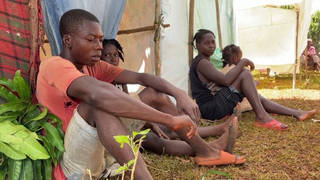
The US military has taken control of the only airport in Port-au-Prince and is facing criticism for diverting some aid planes. Doctors Without Borders says five of its planes carrying surgical teams and equipment weren’t allowed to land and were diverted to Santo Domingo in the Dominican Republic. US forces also turned back a French aid plane carrying a field hospital. Al Jazeera English aired this report on Sunday. [includes rush transcript]
Transcript
JUAN GONZALEZ: We are trying to connect to Amy Goodman and Sharif Abdel Kouddous, who are in Haiti. We’re having some problems. As soon as we get them on, we will start their account of what they’ve seeing for the past few days.
But meanwhile, as criticisms mount over the militarization of US and UN aid efforts, I want to turn to a report from Al Jazeera English on disputes over who controls the aid to Haiti.
SEBASTIAN WALKER: The most visible face of the international aid effort here in Port-au-Prince. Most Haitians here have seen little humanitarian aid so far. What they have seen is guns, and lots of them. Armored personnel carriers cruise the streets. UN soldiers aren’t here to help pull people out of the rubble; they’re here, they say, to enforce the law. This is what much of the UN presence actually looks like on the streets of Port-au-Prince: men in uniform, racing around in vehicles, carrying weapons.
At the entrance to the city’s airport, where most of the aid is coming in, there’s anger and frustration. Much needed supplies of water and food are inside. Haitians are locked out.
HAITIAN MAN: [translated] These weapons they bring, they are instruments of death. We don’t want them. We don’t need them. We are a traumatized people. What we want from the international community is technical help — action, not words.
SEBASTIAN WALKER: And beyond the well guarded perimeter, there’s something else going on. Here, the United States has taken control. It looks more like the Green Zone in Baghdad than a center for aid distribution. Heavily armed US forces patrol the entrances. Even within the airport, these soldiers are never without weapons. There are several thousand on the ground already, and that number is expected to grow.
America now decides who lands in Haiti, and there’s a constant stream of US aircraft arriving with thousands of US boots on the ground. Meanwhile, aid flights from other nations are being turned back. Two Mexican aircraft with vital life-saving equipment were told they couldn’t land on Saturday.
PATRICK ELIE: But we don’t need soldiers, as such, you know? There’s no war here.
SEBASTIAN WALKER: Patrice Ali is the former Haitian defense minister. He’s concerned with the way the Americans have taken over the relief efforts.
PATRICK ELIE: The choice of what lands and what doesn’t land should — you know, the priorities of the flight should be determined by the Haitians. So, otherwise, it’s a takeover. And what might happen is that the need of Haitians are not taken into account, but only either the way a foreign country defines the need of Haiti or try to push its own agenda.
SEBASTIAN WALKER: While the aid operation arriving at the airport grows by the hour, bodies still rot in the streets, and Haitians continue to dig through rubble by themselves, wondering when the help they actually need will arrive.
JUAN GONZALEZ: That’s a report from Al Jazeera English about the continuing militarization of the airport and of the aid coming into Haiti.












Media Options